Written by James M. Dorsey
If played well, security is the United States trump card in stabilizing relations with its Gulf partners and competing with China for regional influence.
In a just-released report, Middle East scholar and former Pentagon official Bilal Y. Saab argued that security entails far more than arms sales and defining the parameters of US security guarantees.
Perhaps, first and foremost, at this stage of the game, it involves reform of the Saudi military and assisting the kingdom in developing the structures and management needed, in Mr. Saab’s words, “to manage, employ, and sustain” sophisticated weaponry and associated strategies and doctrines.
Mr. Saab’s proposition strokes with Saudi Crown Prince Mohammed bin Salman’s plans to transform the kingdom’s military.
Mr. Saab asserted four years into Mr. Bin Salman’s military reforms that “Saudi Arabia still struggles with providing sound strategic, operational, and tactical guidance for its armed forces” and has “difficulty engaging in systematic defence analysis and strategic planning.”
Moreover, according to the former official, the Saudi defense ministry has “little ability to effectively identify, train, deploy and retain a technically capable force. Human resource management policies, functions, and strategies that allow for the recruitment, training, promotion, assignment, and retirement of military personnel are seldom applied… Military academies neither educate nor produce capable Saudi leaders…”
Mr. Saab said, “this means that they (the Saudis) don’t properly prioritise either missions or capabilities and don’t know to properly identify their military requirements.”
Mr. Saab suggested that Saudi Arabia will be in a position to jointly with the United States develop unified defense plans and joint concepts of warfare once it overcomes these hurdles, whether or not with US assistance.
Indications are it will be with US assistance.
The US military is working with Saudi Arabia to develop its first-ever long-term national security vision that would codify “the kingdom’s strategic vision for national security and regional security,” according to Gen. Michael ‘Erik’ Kurilla, the top commander of US forces in the Middle East.
“Our strategic planners travel to the kingdom regularly to work with Saudi military leaders to build up their ideas for a long-term strategic vision,” Mr. Kurilla said.
Ideally, recognising that it has no real alternatives, Saudi Arabia would want a security relationship with the United States that is enshrined in a treaty.
Without a treaty, Mr. Saab’s advocacy of assisting the kingdom in implementing proper integrated Saudi defense management may be the next best thing.
It would be a win-win for both the kingdom and the United States.
While long overdue, reforming the Saudi military opens the door to a paradigm shift that the United States needs as it turns its focus from the Gulf to the Indo-Pacific.
To effectively make the shift, the United States needs Gulf partners capable of defending themselves rather than militarily and psychologically dependent on US intervention at every game stage.
Saudi Arabia’s eight-year-long campaign in Yemen that sought to dislodge Iranian-backed Houthi rebels displayed the kingdom’s military deficiencies.
Those deficiencies take on added significance with Israel stepping up attacks on Iran in the Islamic republic and Syria against the backdrop of fading hopes for a revival of the 2015 international agreement that curbed Iran’s nuclear program and Iran enriching uranium for the first time to 84 per cent purity.
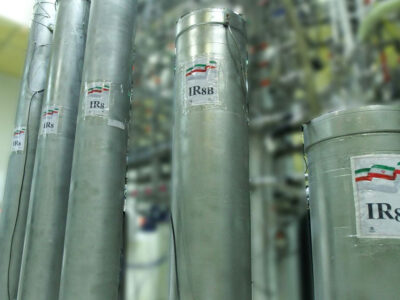
Iran’s Atomic Energy Organization has in the past shown the atomic enrichment facilities at its Natanz nuclear research center. Photo: AGENCE FRANCE-PRESSE/GETTY IMAGES
Moreover, helping the kingdom improve its defense management strokes with four of the five guiding principles of US national security strategy — partnerships, deterrence, diplomacy, and integration. The fifth principle, US values, has fallen by the wayside in the case of Saudi Arabia.
In a race against time, columnist Walter Russell Mead sees enhancing Saudi military capabilities as a way to avoid another Middle East war.
“The best way to avoid war and to minimise direct American engagement should war break out, is to ensure that our Middle East allies have the power to defend themselves,” Mr. Mead said.
Mr. Mead cautions a potential war could erupt if Israel strikes preemptively to prevent Russian arms supplies to Iran from limiting the Jewish state’s ability to target the Islamic republic’s nuclear facilities.
The Biden administration charged in December that Russia was moving to provide advanced military assistance to Iran, including air defense systems, helicopters and Sukhoi Su-35 fighter jets.
Gulf states risk becoming targets in the Israeli Iranian tit-for-tat.
Amir Ali Hajizadeh, the aerospace commander of the Islamic Revolutionary Guards Corps (IRGC), recently said Iran had in the past earmarked targets in Jordan, Kuwait, and the United Arab Emirates for retaliatory missile strikes.
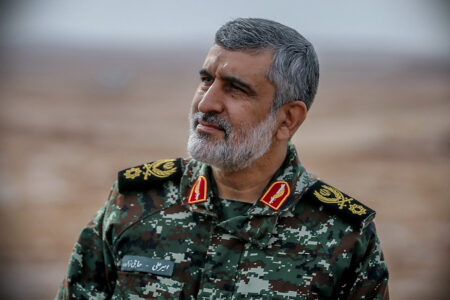
General Amir Ali Hajizadeh, the head of the Revolutionary Guard’s aerospace division, during a military drill in an unknown location in central Iran (AFP)
Furthermore, enhancing Saudi defence management capabilities involving institutional change creates a military umbilical cord that potentially binds the kingdom to the United States even tighter in an environment in which no other power can or will replace the US as its foremost security partner.
“We need to help them get to a point where they actually have functioning bodies, functioning ministries of national security that would allow them to generate enough combat power with that massive budget that they have devoted to defence,” Mr. Bilal said in a webinar convened to present and discuss his report.
The logic of Mr. Saab’s proposition is compelling. The politics less so. The United States is divided on whether and on what conditions strained relations should be reset with the kingdom. The two countries spar over Saudi oil policy, human rights, and the kingdom’s ties with China and Russia.
The domestic US and US-Saudi differences, as well as instances in which the United States failed to live up to Saudi defence expectations, like the 2019 Iranian-backed attacks on Saudi oil facilities that shut down more than five per cent of global oil supply, have entrenched Saudi and Gulf doubts about US reliability as a security partner.
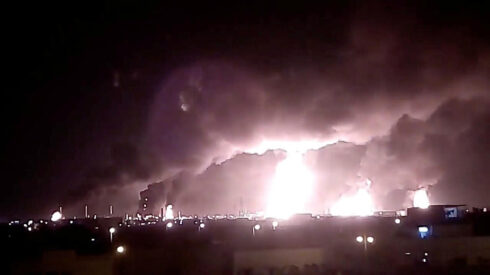
Fires burn in the distance after a drone strike by Yemen’s Iran-aligned Houthi group on Saudi company Aramco’s oil processing facilities, in Buqayq, Saudi Arabia September 14, 2019. Photo: REUTERS
Even so, the Gulf’s geopolitical significance may be rising in US perceptions as it seeks to reconfigure the structure of its engagement.
For one, American strategic thinkers realise that there is no effective Indo-Pacific strategy that does not involve the Arabian Sea.
In addition, the fallout of the Ukraine war demonstrated that the Gulf’s waterways are key to any regional and global security architecture.
Analyst Hussein Ibish noted that President Joe Biden has replaced the 1980 doctrine enunciated by former President Jimmy Carter that committed the United States to prevent any outside force from gaining control of the Gulf with a pledge that the US will “make sure those countries can defend themselves against foreign threats.”
Mr, Ibish echoed Mr. Saab’s assertion that “the very concept that governs the US-Saudi security relationship is flawed. It still centers on US guardianship. It fails to embrace, leverage, and operationalise the element of security partnership with Saudi Arabia.”
Taking his argument further, Mr. Ibish suggested that Mr. Biden’s approach gives Gulf states greater autonomy in maneuvering big power competition.
It allows them to “develop much greater ties with China without threatening the overarching strategic relationship with the US, as long as those measures don’t provide Beijing with an undue strategic foothold in the region,” Mr. Ibish said.
Nevertheless, it takes two to tango for Mr. Biden’s strategic vision and Mr. Saab’s proposition for implementing it to work.
Responding to Mr. Bilal’s presentation in the webinar, former US diplomat and prominent analyst Martin Indyk argued that for the former Pentagon official’s proposition to work, “the Saudis…need to show that they are a responsible partner. We need to show that we are reliable; they need to show that they are responsible.”
US doubts about Saudi Arabia were fueled by Mr. Bin Salman’s brutal crackdown on dissent and freedom of expression; his conduct of the war in Yemen; and, at times, disruptive foreign policy moves, including the 3.5-year long Saudi-led economic and diplomatic boycott of Qatar.
“None of these things represent a responsible partner for the United States. That’s what we need to have assurance of. … The United States cannot play the role alone of policeman in the Gulf in the way it has in the past because we have other priorities that are forcing us to shift resources to other parts of the world…
“That means that the United States has to find a way to do more with less in the Middle East. And if we are to do that, then we need our partners in the Middle East to step up and fill in for what we are no longer able to do… For that, we need a more responsible leadership in Saudi Arabia, and we need a more capable Saudi defence capability,” Mr. Indyk said.
The former diplomat went on to suggest that the degree to which the United States remains committed to the kingdom’s security was a function of the nature of the relationship.
Mr. Indyk argued that “there is tension” between the kingdom’s effort to hedge its bets by enhancing relations with Russia and China “and its desire, as manifested by the request of MbS (Crown Prince Mohammed bin Salman), for a treaty commitment by the United States to Saudi Arabia.”
The kingdom “cannot have it both ways,” Mr. Indyk asserted.
“If it wants that kind of commitment from the United States, it has to line up with the United States… We’re not demanding complete fealty… If our security relationship with Saudi Arabia is to be deepened because the Saudis want it, then there are certain obligations that come with that… If they expect us to be there when the balloon goes up, then they’re going to have to be committed to working with us and not playing off both sides against us,” Mr. Indyk said.
In the latest attempt to straddle both sides of the fence, Saudi Foreign Minister Faisal bin Farhan made a surprise trip to Kyiv, the highest-ranking Saudi visit to Ukraine in 30 years, to negotiate how US$410 million in humanitarian aid the Saudi government authorized last October would be spent.
The visit, the first by a senior Arab official since Russia invaded Ukraine a year ago, was likely designed to counter American criticism of perceived Saudi support for Moscow.
Last week, Saudi Arabia joined 140 other countries in voting in favor of a non-binding United Nations General Assembly resolution calling for Russia’s withdrawal from Ukraine.
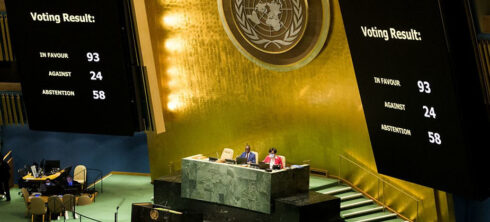
UN General Assembly votes to suspend the rights of the membership of the Russian Federation in the Human Rights Council during an Emergency Special Session on Ukraine. Photo: UN Photo/Manuel Elías
The litmus test for the US approach is likely to be Chinese arms sales to the kingdom. Saudi Arabia has, so far, in contrast to the UAE, limited its Chinese purchases to items the United States has refused to sell, primarily drones and missiles.
At last month’s IDEX 2023 in Abu Dhabi, the Middle East’s foremost defence industry expo, the UAE went a step further by acquiring Chinese-made L-15 multi-role aircraft in a deal that reportedly involves technology transfer and co-production. The UAE also signed a US$245 million agreement to purchase AR3 multiple launcher rocket systems and in-country services from China.
The Gulf states would like to adhere to German Chancellor Olaf Scholz’s maxim.
“China’s rise does not warrant isolating Beijing or curbing cooperation. But neither does China’s growing power justify claims for hegemony in Asia and beyond. No country is the backyard of any other—and that applies to Europe as much as it does to Asia and every other region,” Mr. Scholz wrote in the latest edition of Foreign Affairs.
Even so, the US bet is that enhanced Saudi and Gulf security capabilities, leading to closer cooperation with the United States, will influence how the region leans politically.
Dr. James M. Dorsey is an award-winning journalist and scholar, a Senior Fellow at the National University of Singapore’s Middle East Institute and Adjunct Senior Fellow at Nanyang Technological University’s S. Rajaratnam School of International Studies, and the author of the syndicated column and blog, The Turbulent World of Middle East Soccer.



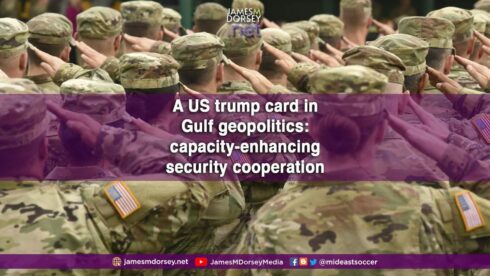
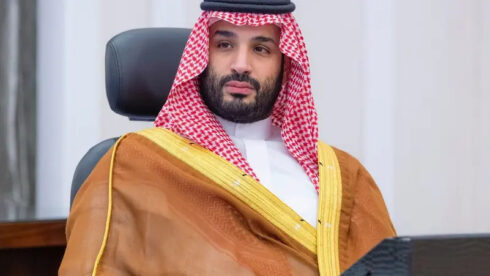

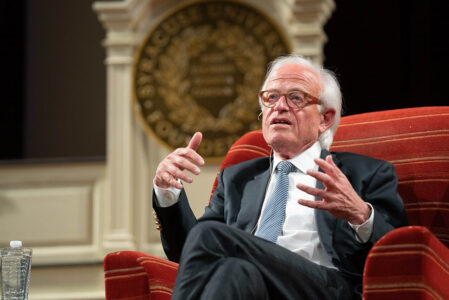



When does the Russian Federation, PRC, India and Iran start the process of a new UN somewhere East before their collective indifference leads them ALL into WWIII courtesy of the U.$. instigator?!!!
Matt
Russian Federation,PCR,India and Iran are all part of the zionist controlled system
Stop dreaming and understand that they are squabbling over piece of meat